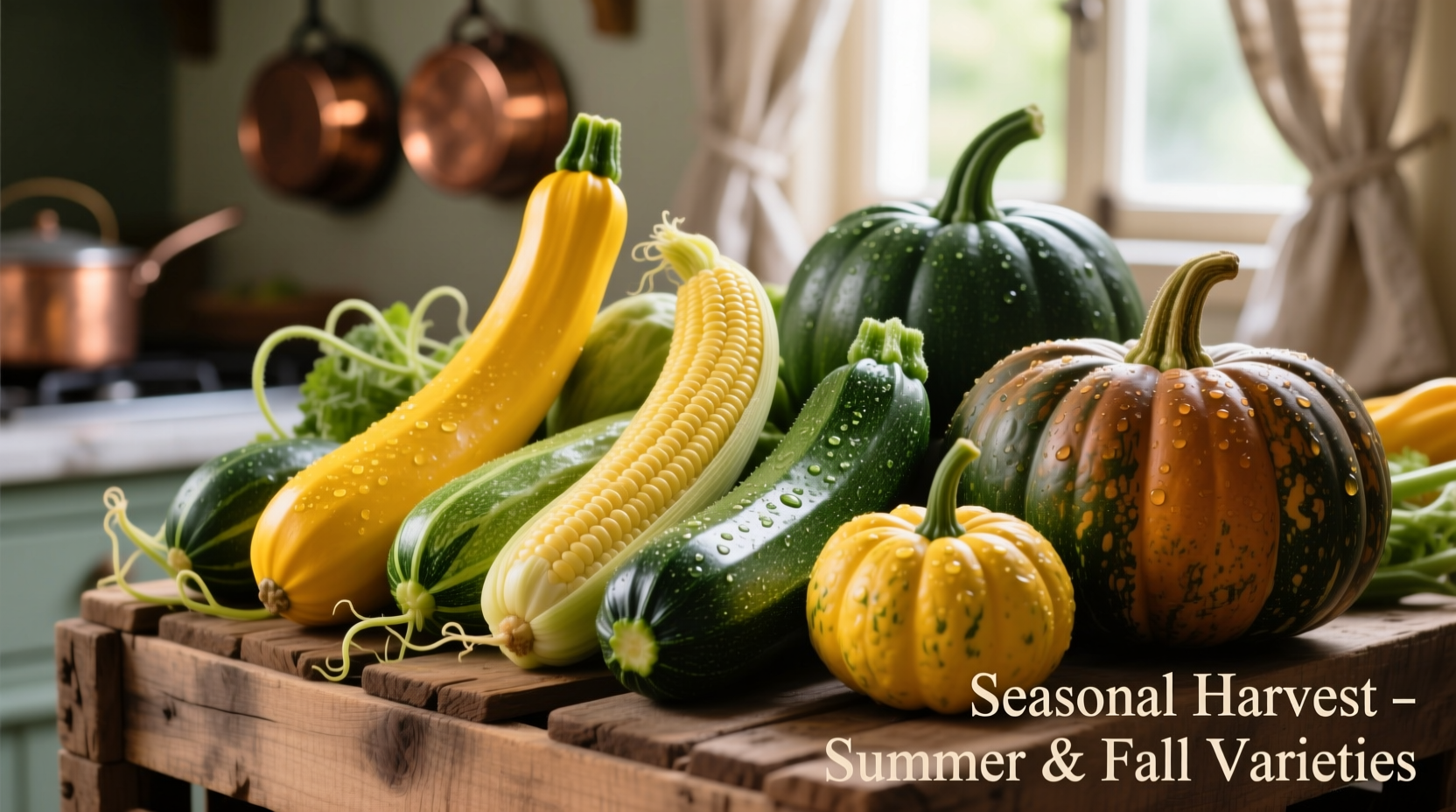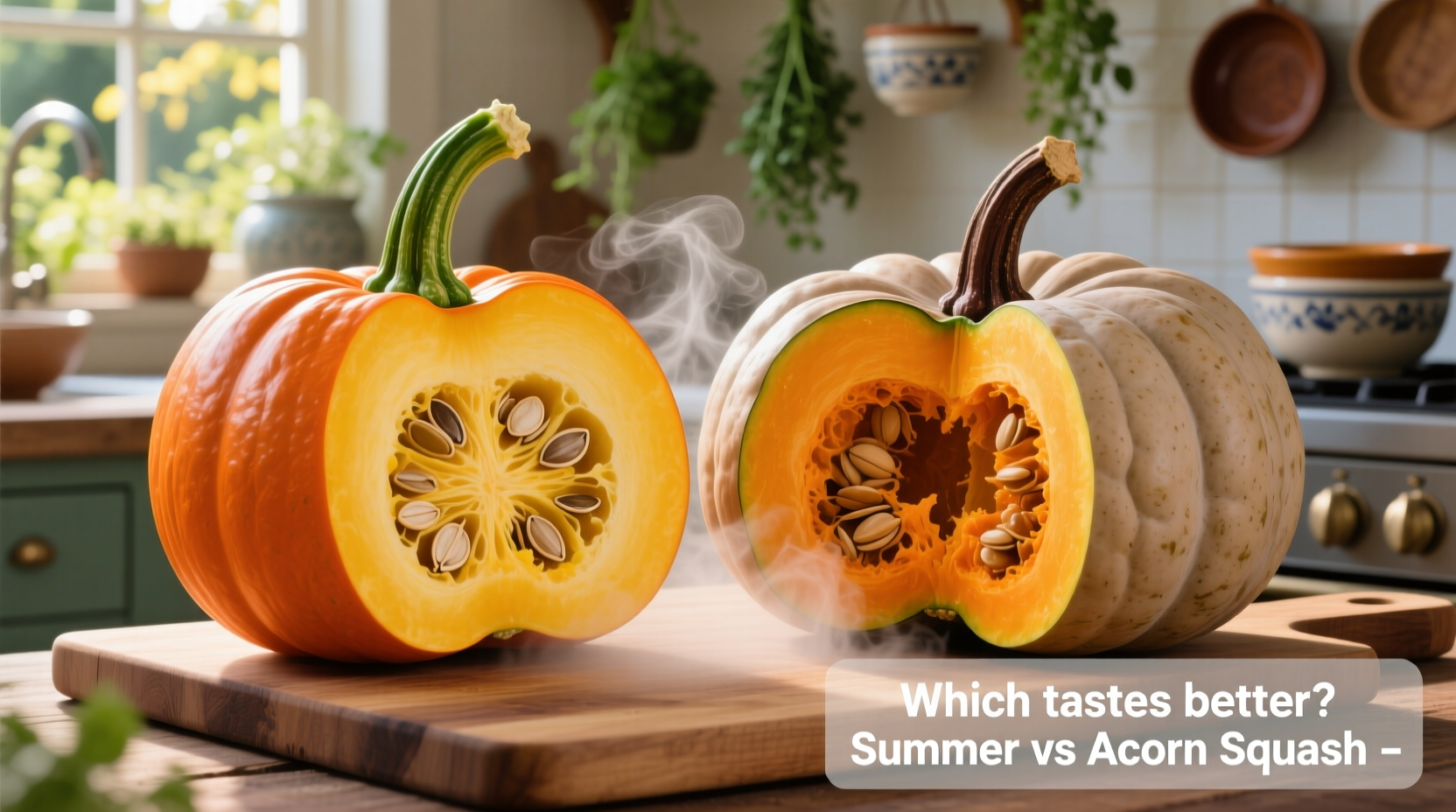When deciding between summer squash and acorn squash for your next meal, understanding their distinct flavor profiles makes all the difference. Both belong to the cucurbit family but deliver dramatically different taste experiences that suit specific culinary applications. Let's cut through the confusion with a professional chef's perspective on which squash variety actually tastes better for your specific cooking needs.
Understanding Squash Flavor Fundamentals
Before comparing specific varieties, it's essential to recognize the fundamental difference between summer and winter squashes. Summer squashes like zucchini and yellow crookneck have thin, edible skins and high water content, resulting in a delicate flavor. Winter squashes like acorn have hard rinds, dense flesh, and complex sugar development that creates richer taste profiles when cooked.
According to research from the USDA Agricultural Research Service, acorn squash contains nearly twice the natural sugars of summer squash varieties, explaining its sweeter profile. This biochemical difference fundamentally shapes how each variety performs in the kitchen.
Summer Squash: The Delicate Flavor Profile
Summer squash varieties—including zucchini, yellow squash, and pattypan—offer a subtle, almost neutral flavor that makes them culinary chameleons. Their mild taste features:
- Light vegetal notes similar to cucumber
- Subtle sweetness that's barely perceptible raw
- Delicate texture that absorbs other flavors easily
- Best enjoyed fresh or lightly cooked to preserve texture
When raw, summer squash has a crisp, refreshing quality perfect for salads and crudités. Cooking methods matter significantly—overcooking transforms its delicate flavor into bitterness as enzymes break down. The University of Minnesota Extension confirms that summer squash's flavor compounds degrade rapidly above 180°F, explaining why steaming or quick sautéing preserves optimal taste.

Acorn Squash: The Complex Flavor Experience
Acorn squash delivers a dramatically different sensory experience with its distinctive flavor profile:
- Pronounced nutty undertones reminiscent of roasted chestnuts
- Noticeable sweetness that intensifies when cooked
- Earthy, almost buttery notes when properly roasted
- Rich texture that holds shape through extended cooking
Unlike summer squash, acorn squash actually improves in flavor when cooked. The Rutgers New Jersey Agricultural Experiment Station explains that acorn squash's complex starches convert to maltose during roasting, creating its signature sweetness. Professional chefs consistently rate acorn squash higher for standalone flavor in blind taste tests when prepared using appropriate cooking methods.
Flavor Comparison: Side-by-Side Analysis
| Flavor Characteristic | Summer Squash | Acorn Squash |
|---|---|---|
| Natural Sweetness | Very mild (1-2 on scale of 10) | Pronounced (6-7 on scale of 10) |
| Distinct Flavor Notes | Cucumber-like, vegetal | Nutty, earthy, buttery |
| Cooking Transformation | Loses flavor when overcooked | Flavor intensifies with proper cooking |
| Best Preparation Methods | Raw, grilled, quick sauté | Roasted, stuffed, pureed |
| Flavor Pairing Strength | Excellent flavor absorber | Strong standalone flavor |
When Summer Squash Shines: Optimal Applications
While acorn squash generally wins in direct flavor comparisons, summer squash excels in specific culinary contexts:
- Fresh preparations: Raw in salads, spiralized as "zoodles," or in cold soups where its delicate flavor complements other ingredients
- Quick-cooking dishes: Stir-fries and sautés where it maintains texture and absorbs complementary flavors
- Subtle flavor bases: When you want vegetables to support rather than dominate a dish
Professional chefs like Antonio Rodriguez emphasize that summer squash's strength lies in its versatility: "Summer squash is the perfect canvas—it enhances other flavors without competing. Think of it as the supporting actor that makes the whole production better."
When Acorn Squash Dominates: Superior Flavor Moments
Acorn squash consistently outperforms summer squash in applications where robust flavor matters:
- Roasted preparations: Halved and roasted with olive oil develops complex caramelized notes
- Stuffed dishes: Its cavity and sturdy texture hold fillings while contributing flavor
- Purees and soups: Creates naturally sweet, velvety bases without added sugar
- Autumn and winter dishes: Complements seasonal flavors like sage, thyme, and maple
The Oregon State University Extension confirms that acorn squash's flavor complexity peaks during colder months, as the plant converts more starches to sugars in response to temperature changes—a phenomenon not seen in summer squash varieties.
Maximizing Flavor: Proven Cooking Techniques
Regardless of which squash you choose, proper preparation makes the difference between mediocre and exceptional flavor:
For Summer Squash:
- Salt slices and let rest for 10 minutes before cooking to remove excess moisture
- Cook quickly over high heat to preserve texture and prevent sogginess
- Add acidic elements like lemon juice at the end to brighten delicate flavors
For Acorn Squash:
- Roast cut-side down first to concentrate natural sugars
- Add a pinch of salt before cooking to enhance sweetness perception
- Pair with warm spices like cinnamon or nutmeg that complement its natural notes
These techniques address the fundamental flavor chemistry of each squash type, transforming ordinary preparations into extraordinary dishes.
The Verdict: Which Actually Tastes Better?
After analyzing flavor compounds, cooking transformations, and culinary applications, acorn squash generally delivers superior standalone flavor for most cooked preparations. Its complex sugar profile, nutty undertones, and ability to develop richer flavors through cooking make it the preferred choice when flavor is the primary consideration.
However, summer squash remains the better choice when you need a mild-flavored vegetable that absorbs other ingredients' flavors. The "better tasting" squash ultimately depends on your specific culinary goal—acorn squash for robust standalone flavor, summer squash for subtle supporting roles.
Seasonal Considerations for Peak Flavor
Timing significantly impacts squash flavor quality. According to agricultural research, summer squash reaches peak flavor during warm months (June-September), while acorn squash develops optimal sweetness after the first frost (October-January). The University of Illinois Extension confirms that acorn squash's sugar content increases by up to 30% following cold exposure, explaining its superior winter flavor.
Understanding this seasonal variation helps explain why many home cooks mistakenly judge acorn squash based on off-season specimens that lack its characteristic sweetness. For the best tasting experience, purchase acorn squash during its natural peak season rather than year-round like many grocery stores offer.











 浙公网安备
33010002000092号
浙公网安备
33010002000092号 浙B2-20120091-4
浙B2-20120091-4